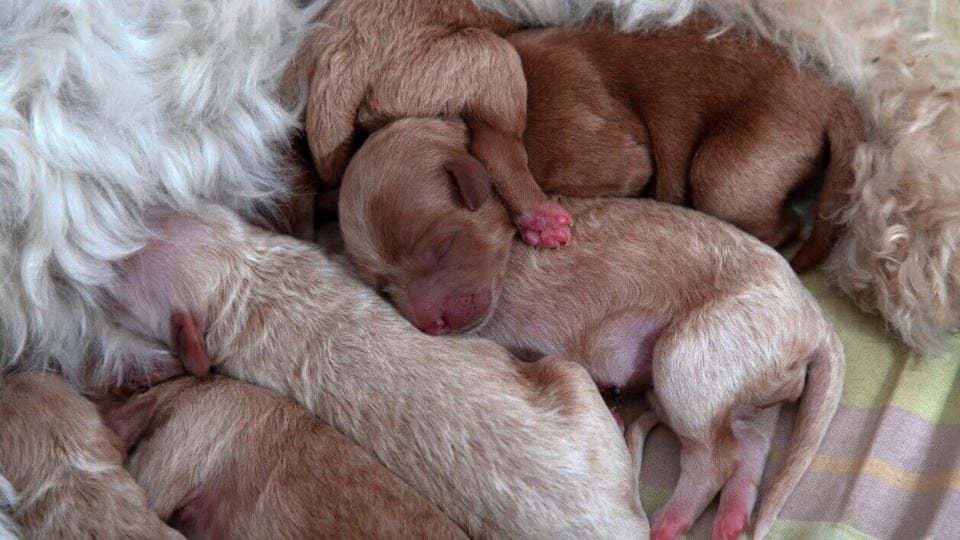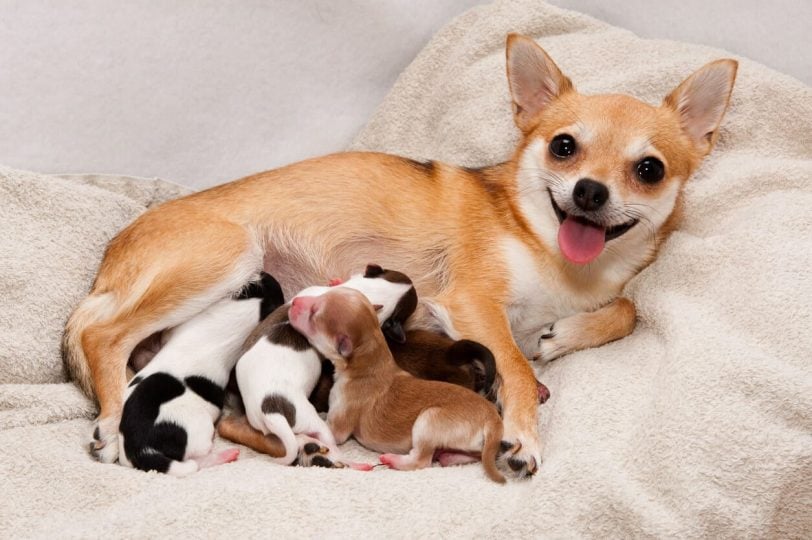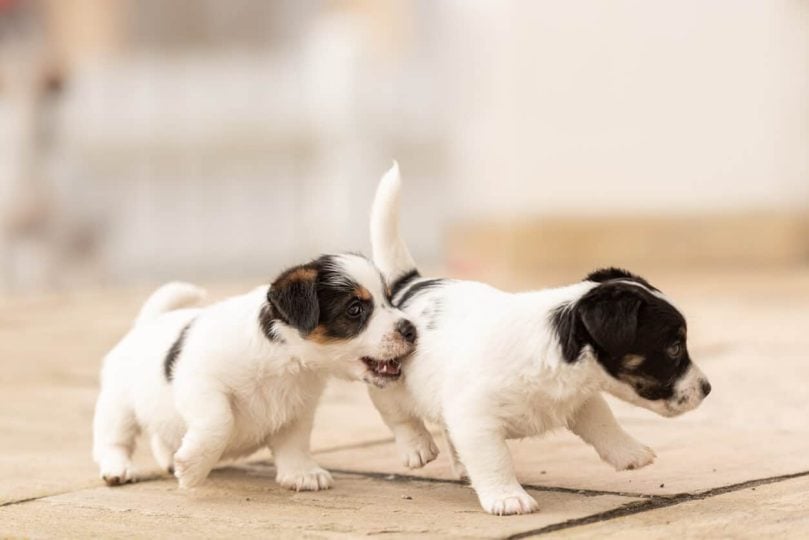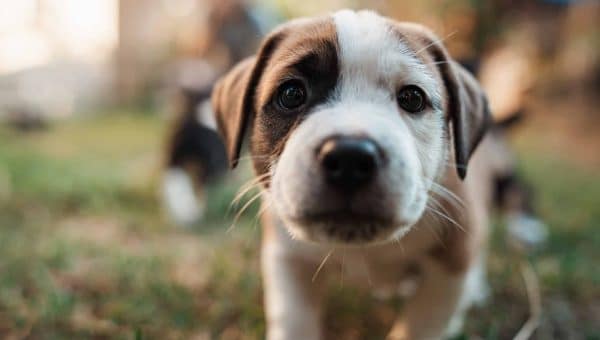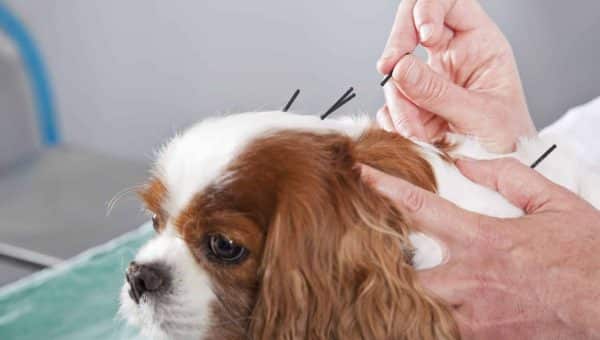- Not a substitute for professional veterinary help.
A litter of new puppies can be exciting and a bit nerve-wracking at the same time—especially when you see their tiny size and tightly shut eyes. You might wonder whether it’s safe to pick them up, or even touch them, and when they’ll open their eyes and start to walk.
Puppies open their eyes for the first time when they’re about two weeks old, but it takes about 10 weeks for their eyes to fully develop. In other words, your puppy’s vision may be limited for their first several weeks of life.
Read on for answers to all your questions about newborn puppies, including why they’re born with closed eyes, when their other senses develop, and how to spot any irregularities in their development.
When Do Puppies Open Their Eyes?
Your puppy’s eyes will most likely open by the time they reach two weeks of age. But some puppies may open their eyes sooner, after about 10 days, while other puppies may not open their eyes for about three weeks. The timing can vary from dog to dog, and breed to breed.
“Dog breeds that open their eyes earlier than others are giant ones like a Great Dane, Mastiff, and Saint Bernard,” says veterinarian Tehreem Puri.
Avoid opening your puppy’s eyes for them, even if it takes more than two weeks for their eyes to open. A puppy’s eyes develop in a very specific way and time, and opening their eyes too soon could cause lasting damage.
If you think your puppy should have opened their eyes already, call a veterinarian for more guidance.
How to spot a problem with a newborn puppy’s eyes
If you notice your newborn dog’s eyes look grayish-blue when they first open, there’s no need for concern. This is completely normal, and your puppy’s vision will continue to develop over the next several weeks.
However, it’s important to keep their environment extra clean to help prevent any infections and pay attention to any signs of developmental concerns.
Puppies may sometimes develop conditions like corneal injuries, dry eye, or entropion, which happens when their eyelids roll in and scratch their cornea.
Some of the symptoms of these conditions include:
- Bloodshot eyes
- Holding their eyes shut
- Excessive tears
- Discharge from the eyes
- Frequent blinking
- Pawing at their eyes
If you notice any of the above symptoms, contact a vet right away.
Both injuries and infections like conjunctivitis can cause permanent damage if left untreated. It’s always best to consult a vet right away if you have any concerns about your puppy’s eyes, but you’ll want to call your vet immediately if you notice signs of conjunctivitis, including:
- Eye weeping or discharge, which may be clear or green
- Reddened whites of the eyes
- Swelling or bulging around the eyes or under the eyelid
- Pawing at their eye
- Frequent squinting or blinking
Why Do Puppies Wait to Open Their Eyes?
A puppy’s eyes will open once their brain reaches a certain point of maturity. In fact, that’s the case for most mammals, including humans.
But unlike humans, some mammals give birth before their babies’ brains have reached that specific stage of maturity. This is because mammals are born at different body and brain developmental stages, depending on their survival needs and their chances of survival.
Mother dogs in the wild need to give birth to their puppies sooner, so they can leave them in a safe place and continue to hunt and provide for them. When first born, puppies don’t need to use their eyes right away. They only need to breathe and nurse in order to continue growing and developing.
Other Newborn Puppy Development Stages, Explained
From birth through your puppy’s first 16 weeks of life, you’ll notice plenty of big changes.
As puppies grow older and develop their senses, they’ll depend on their mother less and socialize with their siblings more. They’ll also begin to move around, play, explore and bark. And when they reach about six weeks of age, puppies can begin forming attachments to humans.
When can puppies smell, hear, and respond to touch?
Wondering when your puppy’s other four senses develop? The chart below breaks them down.
| Puppy Sense | Age of Development |
| Smell | Birth |
| Open Eyes | Up to 2 weeks after birth |
| Open Ears | Up to 2 weeks after birth |
| Response to Touch | From birth |
When do puppies learn to walk?
Newborn puppies can crawl shortly after birth, but they won’t be able to walk or run for several weeks. Here’s what to expect from puppy movement during the first few weeks of life.
| Stage of Development | Age of Development |
| Crawling | Shortly after birth |
| Walking | 3-4 weeks after birth |
| Exploring | 4+ weeks after birth |
| Running and active play | 8 weeks after birth |
What To Expect From Your Puppy’s First Several Weeks
Wondering how your puppy will grow and develop over their first few months of life? The table below gives a big-picture view of puppy development from birth to 16 weeks.
| Week | Development Stage |
| Newborn | Puppies can smell, feel touch and body heat, suck, and crawl. |
| Weeks 1-2 | Puppies’ eyes and ears start to open. |
| Weeks 2-4 | Puppies can stand up, and they’ll begin taking first steps. |
| Weeks 3-16 | Puppies will walk, explore, and begin socializing with siblings and people. They’ll start to wean off mother’s milk once they develop teeth, usually around four weeks. Their hearing will fully develop around five weeks of age. Puppies can move to their new homes once they’re eight weeks old, and you can start housetraining around 12 weeks. |
| Beyond 16 weeks | Puppies will grow rapidly and become more coordinated. They have plenty of energy for playing and will need plenty of chew toys as they teethe. Puppies can’t exercise for as long as adult dogs, so keep puppy walks and playtime sessions short. |
When can you touch newborn puppies?
If you’ve heard some mother dogs will reject their puppies if you touch them, rest assured: This is a myth.
Of course, you’ll still want to take extreme care when handling newborn puppies, since they’re very delicate.
There’s no hard-and-fast rule about when it’s safe to touch newborn puppies. As a general rule, though, try to handle them only minimally until they begin moving around.
“Once puppies are about three weeks old, they start to move around, and that’s a good time to pet and interact with them,” Puri says. But again, just make sure to be as gentle as possible.
Remember, too, that it’s important to socialize puppies—both with other dogs and people—as much as possible between four and 16 weeks of age. Puppies who don’t get this stimulation and contact may have trouble with emotional development and bonding with humans.
Takeaway
Don’t be surprised by a newborn puppy’s closed eyes or fragile appearance—their brains and bodies will continue to develop for several weeks.
In the meantime, keep their space clean, stock up on new puppy essentials, ask your vet about any concerns, and don’t forget to take plenty of pictures as they grow!
